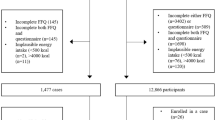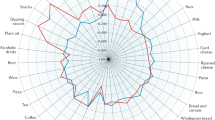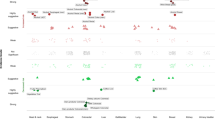Abstract
Background/Objectives
Poor diet quality has been associated with an increased risk of cancer. Here, we examine the association between dietary patterns derived with two methods, and combined and site-specific cancer incidence in Canada.
Subjects/Methods
Dietary data were obtained from participants enrolled in Alberta’s Tomorrow Project, a prospective cohort study, between 2000 and 2008. Principle component analysis (PCA) and reduced rank regression (RRR) were used to derive dietary patterns, and data linkage with the Alberta Cancer Registry was used for incident cancer cases. Cox proportional hazard regressions were used to estimate multivariable-adjusted models for the association between each dietary pattern score with combined and site-specific cancer incidence.
Results
PCA revealed three dietary patterns (“western”, “prudent”, and “sugar, fruits, and dairy”) and RRR resulted in four patterns (“dietary fiber“, “vitamin D”, “fructose”, and “discretionary fat”). Five cancer sites were included in our site-specific analysis: lung, colon, breast, prostate, and endometrial cancers. The most protective dietary patterns for combined cancer sites were the “Prudent” pattern (HR = 0.82, CI = 0.73–0.92) and the “Dietary fiber” pattern (HR = 0.82, CI = 0.69–0.97). The “Fructose” pattern was associated with increased risk of combined cancers (HR = 1.14, CI = 1.02–1.27). Three dietary patterns were protective against colon cancer (“Prudent”, “Dietary fiber”, and “Discretionary fats”), and other risk reductions were seen for the “sugar, fruit, and dairy” pattern (lung cancer), and the “Dietary fiber” pattern (prostate cancer).
Conclusions
These results support cancer prevention strategies for a diet high in vegetables, fruits, fish, and whole grains. Further studies should explore the possible association between discretionary fats and colon cancer.
This is a preview of subscription content, access via your institution
Access options
Subscribe to this journal
Receive 12 print issues and online access
$259.00 per year
only $21.58 per issue
Buy this article
- Purchase on Springer Link
- Instant access to full article PDF
Prices may be subject to local taxes which are calculated during checkout
Similar content being viewed by others
References
Poirier AE, Ruan Y, Volesky KD, King WD, O’Sullivan DE, Gogna P, et al. The current and future burden of cancer attributable to modifiable risk factors in Canada: summary of results. Prev Med. 2019;122:140–7. https://doi.org/10.1016/j.ypmed.2019.04.007.
Poirier AE, Ruan Y, Hebert LA, Grevers X, Walter SD, Villeneuve PJ, et al. Estimates of the current and future burden of cancer attributable to low fruit and vegetable consumption in Canada. Prev Med. 2019;122:20–30. https://doi.org/10.1016/j.ypmed.2019.03.013.
Blot WJ, Tarone RE. Doll and Peto’s quantitative estimates of cancer risks: holding generally true for 35 years. J Natl Cancer Inst. 2015;107:djv044. https://doi.org/10.1093/jnci/djv044.
Bamia C. Dietary patterns in association to cancer incidence and survival: concept, current evidence, and suggestions for future research. Eur J Clin Nutr. 2018;72:818–25. https://doi.org/10.1038/s41430-018-0128-8.
Solbak NM, Xu JY, Vena JE, Csizmadi I, Whelan HK, Robson PJ. Diet quality is associated with reduced incidence of cancer and self-reported chronic disease: observations from Alberta’s Tomorrow Project. Prev Med. 2017;101:178–87. https://doi.org/10.1016/j.ypmed.2017.06.009.
Schulze MB, Martinez-Gonzalez MA, Fung TT, Lichtenstein AH, Forouhi NG. Food based dietary patterns and chronic disease prevention. BMJ. 2018;361:k2396 https://doi.org/10.1136/bmj.k2396.
World Cancer Research Fund/American Institute for Cancer Research. Diet, nutrition, physical activity and cancer: a global perspective. Continuous update project expert report. London: World Cancer Research Fund International; 2018.
Robson PJ, Solbak NM, Haig TR, Whelan HK, Vena JE, Akawung AK, et al. Design, methods and demographics from phase I of Alberta’s Tomorrow Project cohort: a prospective cohort profile. CMAJ Open. 2016;4:E515.
Subar AF, Thompson FE, Kipnis V, Midthune D, Hurwitz P, McNutt S, et al. Comparative validation of the Block, Willett, and National Cancer Institute food frequency questionnaires: the eating at America’s Table Study. Am J Epidemiol. 2001;154:1089–99. https://doi.org/10.1093/aje/154.12.1089.
Csizmadi I, Kahle L, Ullman R, Dawe U, Zimmerman TP, Friedenreich CM, et al. Adaptation and evaluation of the National Cancer Institute’s Diet History Questionnaire and nutrient database for Canadian populations. Public Health Nutr. 2007;10:88–96.
Krebs-Smith SM, Cronin FJ, Haytowitz DB, Cook DA. Food sources of energy, macronutrients, cholesterol, and fiber in diets of women. J Am Diet Assoc. 1992;92:168–74.
Subar AF, Midthune D, Kulldorff M, Brown CC, Thompson FE, Kipnis V, et al. Evaluation of alternative approaches to assign nutrient values to food groups in food frequency questionnaires. Am J Epidemiol. 2000;152:279–86. https://doi.org/10.1093/aje/152.3.279.
Csizmadi I, Boucher BA, Siou GL, Massarelli I, Rondeau I, Garriguet D, et al. Using national dietary intake data to evaluate and adapt the US Diet History Questionnaire: the stepwise tailoring of an FFQ for Canadian use. Public Health Nutr. 2016;19:3247–55.
McNeil J, Barberio AM, Friedenreich CM, Brenner DR. Sleep and cancer incidence in Alberta’s Tomorrow Project cohort. Sleep. 2019;42:zsy252. https://doi.org/10.1093/sleep/zsy252.
Hoffmann K, Schulze MB, Schienkiewitz A, Nöthlings U, Boeing H. Application of a new statistical method to derive dietary patterns in nutritional epidemiology. Am J Epidemiol. 2004;159:935–44.
Hatcher L. A step-by-step approach to using SAS for factor analysis and structural equation modeling. Cary, NC. Ist edn. In: SAS Publishing; 1994.
Corner S. Choosing the right type of rotation in PCA and EFA. JALT Test Evaluation SIG Newsl. 2009;13:20–25.
Weikert C, Schulze MB. Evaluating dietary patterns: the role of reduced rank regression. Curr Opin Clin Nutr Metab Care. 2016;19:341–6. https://doi.org/10.1097/MCO.0000000000000308.
Mao QQ, Lin YW, Chen H, Qin J, Zheng XY, Xu X, et al. Dietary fiber intake is inversely associated with risk of pancreatic cancer: a meta-analysis. Asia Pac J Clin Nutr. 2017;26:89–96. https://doi.org/10.6133/apjcn.102015.03.
Wang CH, Qiao C, Wang RC, Zhou WP. Dietary fiber intake and pancreatic cancer risk: a meta-analysis of epidemiologic studies. Sci Rep. 2015;5:10834 https://doi.org/10.1038/srep10834.
Chen Z, Wang PP, Woodrow J, Zhu Y, Roebothan B, McLaughlin JR, et al. Dietary patterns and colorectal cancer: results from a Canadian population-based study. Nutr J. 2015;14:8 https://doi.org/10.1186/1475-2891-14-8.
Yusof AS, Isa ZM, Shah SA. Dietary patterns and risk of colorectal cancer: a systematic review of cohort studies (2000–2011). Asian Pac J Cancer Prev. 2012;13:4713–7. https://doi.org/10.7314/apjcp.2012.13.9.4713.
Song M, Chan AT, Fuchs CS, Ogino S, Hu FB, Mozaffarian D, et al. Dietary intake of fish, omega-3 and omega-6 fatty acids and risk of colorectal cancer: a prospective study in U.S. men and women. Int J Cancer. 2014;135:2413–23. https://doi.org/10.1002/ijc.28878.
Chen S, Chen Y, Ma S, Zheng R, Zhao P, Zhang L, et al. Dietary fibre intake and risk of breast cancer: a systematic review and meta-analysis of epidemiological studies. Oncotarget. 2016;7:80980–9. https://doi.org/10.18632/oncotarget.13140.
Deschasaux M, Pouchieu C, His M, Hercberg S, Latino-Martel P, Touvier M. Dietary total and insoluble fiber intakes are inversely associated with prostate cancer risk. J Nutr. 2014;144:504–10. https://doi.org/10.3945/jn.113.189670.
Deschasaux M, Zelek L, Pouchieu C, His M, Hercberg S, Galan P, et al. Prospective association between dietary fiber intake and breast cancer risk. PLoS ONE. 2013;8:e79718 https://doi.org/10.1371/journal.pone.0079718.
Kawakita D, Lee YA, Turati F, Parpinel M, Decarli A, Serraino D, et al. Dietary fiber intake and head and neck cancer risk: a pooled analysis in the International Head and Neck Cancer Epidemiology consortium. Int J Cancer. 2017;141:1811–21. https://doi.org/10.1002/ijc.30886.
Xu H, Ding Y, Xin X, Wang W, Zhang D. Dietary fiber intake is associated with a reduced risk of ovarian cancer: a dose-response meta-analysis. Nutr Res. 2018;57:1–11. https://doi.org/10.1016/j.nutres.2018.04.011.
Shu L, Wang X-Q, Wang S-F, Wang S, Mu M, Zhao Y, et al. Dietary patterns and stomach cancer: a meta-analysis. Nutr cancer. 2013;65:1105–15.
Magalhaes B, Peleteiro B, Lunet N. Dietary patterns and colorectal cancer: systematic review and meta-analysis. Eur J Cancer Prev. 2012;21:15–23.
Krusińska B, Hawrysz I, Słowińska M, Wądołowska L, Biernacki M, Czerwińska A, et al. Dietary patterns and breast or lung cancer risk: a pooled analysis of 2 case-control studies in north-eastern Poland. Adv Clin Exp Med. 2017;26:1367–75.
Catsburg C, Kim RS, Kirsh VA, Soskolne CL, Kreiger N, Rohan TE. Dietary patterns and breast cancer risk: a study in 2 cohorts. Am J Clin Nutr. 2015;101:817–23.
Link LB, Canchola AJ, Bernstein L, Clarke CA, Stram DO, Ursin G, et al. Dietary patterns and breast cancer risk in the California Teachers Study cohort. Am J Clin Nutr. 2013;98:1524–32.
Demetriou CA, Hadjisavvas A, Loizidou MA, Loucaides G, Neophytou I, Sieri S, et al. The mediterranean dietary pattern and breast cancer risk in Greek-Cypriot women: a case-control study. BMC Cancer. 2012;12:113.
Rosato V, Edefonti V, Bravi F, Bosetti C, Bertuccio P, Talamini R, et al. Nutrient-based dietary patterns and prostate cancer risk: a case–control study from Italy. Cancer Causes Control. 2014;25:525–32.
Vieira AR, Abar L, Vingeliene S, Chan DS, Aune D, Navarro-Rosenblatt D, et al. Fruits, vegetables and lung cancer risk: a systematic review and meta-analysis. Ann Oncol. 2016;27:81–96. https://doi.org/10.1093/annonc/mdv381.
Bradbury KE, Appleby PN, Key TJ. Fruit, vegetable, and fiber intake in relation to cancer risk: findings from the European Prospective Investigation into Cancer and Nutrition (EPIC). Am J Clin Nutr. 2014;100 Suppl 1:394S–398S. https://doi.org/10.3945/ajcn.113.071357.
Buchner FL, Bueno-de-Mesquita HB, Linseisen J, Boshuizen HC, Kiemeney LA, Ros MM, et al. Fruits and vegetables consumption and the risk of histological subtypes of lung cancer in the European Prospective Investigation into Cancer and Nutrition (EPIC). Cancer Causes Control. 2010;21:357–71. https://doi.org/10.1007/s10552-009-9468-y.
Farvid MS, Cho E, Chen WY, Eliassen AH, Willett WC. Premenopausal dietary fat in relation to pre- and post-menopausal breast cancer. Breast Cancer Res Treat. 2014;145:255–65. https://doi.org/10.1007/s10549-014-2895-9.
Cao Y, Hou L, Wang W. Dietary total fat and fatty acids intake, serum fatty acids and risk of breast cancer: a meta-analysis of prospective cohort studies. Int J Cancer. 2016;138:1894–904. https://doi.org/10.1002/ijc.29938.
Guenther PM, Reedy J, Krebs-Smith SM, Reeve BB, Basiotis PP. Development and evaluation of the healthy eating index-2005: technical report. Center for Nutrition Policy and Promotion, U.S. Department of Agriculture, Washington DC, 2007. https://vtechworks.lib.vt.edu/bitstream/handle/10919/18682/HEI-2005TechnicalReport.pdf?sequence=3.
Subar AF, Freedman LS, Tooze JA, Kirkpatrick SI, Boushey C, Neuhouser ML, et al. Addressing current criticism regarding the value of self-report dietary data. J Nutr. 2015;145:2639–45. https://doi.org/10.3945/jn.115.219634.
Lipworth L, Bender TJ, Rossi M, Bosetti C, Negri E, Talamini R, et al. Dietary vitamin D intake and cancers of the colon and rectum: a case-control study in Italy. Nutr Cancer. 2009;61:70–75. https://doi.org/10.1080/01635580802348633.
Government of Canada. Vitamin D and calcium: updated dietary reference intakes. In: Canada H, editor. Ottawa: Government of Canada; 2019.
Janz T, Pearson C Health at a Glance: Vitamin D blood levels of Canadians. Statistics Canada Catalogue 82-624-X 2015. https://www150.statcan.gc.ca/n1/pub/82-624-x/2013001/article/11727-eng.htm.
Acknowledgements
Dr. Jessica McNeil is a recipient of Postdoctoral Fellowship Awards from the Canadian Institutes of Health Research and Alberta Innovates. Dr. Christine Friedenreich was supported by a Health Senior Scholar Award from Alberta Innovates-Health Solutions and the Alberta Cancer Foundation Weekend to End Women’s Cancers Breast Cancer Chair. Dr. Darren Brenner was supported by a Capacity Development Award in Cancer Prevention from the Canadian Cancer Society (#703917). Alberta’s Tomorrow Project is only possible due to the commitment of its research participants, its staff, and its funders: Alberta Health and the Alberta Cancer Prevention Legacy Fund, Alberta Cancer Foundation, Canadian Partnership Against Cancer and substantial in kind funding from Alberta Health Services. The views expressed herein represent the views of the authors and not of Alberta’s Tomorrow Project or any of its funders.
Funding
Alberta’s Tomorrow Project received funding from Alberta Health and the Alberta Cancer Prevention Legacy Fund, the Alberta Cancer Foundation, the Canadian Partnership Against Cancer and substantial in kind funding from Alberta Health Services. Funding was not received for the analysis and writing of this manuscript.
Author information
Authors and Affiliations
Contributions
R.F.W., J.M., S.T.J., C.M.F., and D.R.B. were involved in the conception of the research question and analyses. R.F.W. conducted statistical analyses. R.F.W., J.M., and E.H. drafted the manuscript. All authors critically revised the manuscript for intellectual content, approved the final version of the manuscript, and agreed to be accountable for all aspects of the work ensuring that questions related to the accuracy or integrity of any part of the work at appropriately investigated and resolved.
Corresponding author
Ethics declarations
Conflict of interest
The authors declare no competing interests.
Additional information
Publisher’s note Springer Nature remains neutral with regard to jurisdictional claims in published maps and institutional affiliations.
Supplementary information
Rights and permissions
About this article
Cite this article
Willemsen, R.F., McNeil, J., Heer, E. et al. Dietary patterns with combined and site-specific cancer incidence in Alberta’s Tomorrow Project cohort. Eur J Clin Nutr 76, 360–372 (2022). https://doi.org/10.1038/s41430-021-00958-7
Received:
Revised:
Accepted:
Published:
Issue Date:
DOI: https://doi.org/10.1038/s41430-021-00958-7
This article is cited by
-
Adhere to the Chinese dietary guidelines associated with better subjective well-being: evidence from a cross-sectional survey and a daily diary investigation
BMC Public Health (2024)
-
Sex-specific associations of empirically derived dietary patterns with colorectal cancer risk in a Korean population: a case‒control study
Scientific Reports (2024)
-
Diet quality and lung cancer incidence in a low-income population in the United States
British Journal of Cancer (2023)
-
Dietary Patterns and Risk of Lung Cancer: A Systematic Review and Meta-Analyses of Observational Studies
Current Nutrition Reports (2023)



